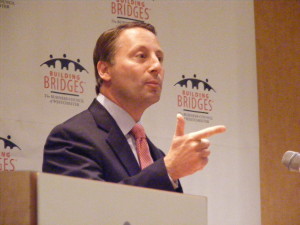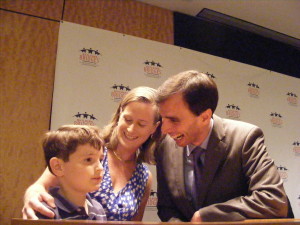County Executive Robert P. Astorino said he kept the promises he made when elected in 2009, keeping the tax rate flat and cutting county spending. But his challenger, Democrat Noam Bramson, said the last four years weren’t a mission accomplished, with missed opportunities of leadership from an executive he portrayed as part of the conservative fringe.
The two candidates traded jabs Wednesday night at the first debate of the 2013 election season, hosted by the Westchester Business Council at the Reckson Metro Center. Astorino said that when he became county executive in January 2010, Westchester faced a $66 million budget deficit and had seen a 17 percent increase in county property taxes in the last five years.
“When we got into office, we were in a tailspin; this county was going in the wrong direction ”“ taxing like crazy, spending like crazy, saying yes to everything,” Astorino said. With some “hard choices” that included cuts to staffing, during his tenure the tax levy has been reduced 2 percent. “That may not even buy a couple of Starbucks over the next year but the arrow is going the right way, it”™s been stabilized.”

Bramson, the current mayor of New Rochelle, countered that tax increases were kept down under Astorino through borrowing. He criticized Astorino”™s cuts to child care subsidies and the gun shows that the executive brought back to the Westchester County Center after they had previously been banned.
“This is the most right wing and extreme administration in the modern history of Westchester County that has a philosophy of ”˜that”™s not my problem, that”™s your problem,” he said, after noting Astorino”™s reputation as a “nice guy.” “The tea party with a smile is still the tea party and campaigning like Nelson Rockefeller is not very impressive if you are going to govern like Newt Gingrich.”
The candidates sparred over county-owned Playland park, which Astorino said runs at annual deficits ranging from $2 million to $3 million. “As a father, I love Playland, as county executive Playland has been a big problem,” he said. Astorino has signed an agreement with a Rye nonprofit called Sustainable Playland Inc. to manage the park and shift the focus to an all-seasons recreational park. “The county has proven it can”™t run an amusement park,” Astorino said.
Bramson said he”™d be in favor of analyzing options but criticized Sustainable”™s plans for lacking focus or tangible financial projections to get the park running in the black. He also questioned attendance figures and revenues, which are mostly based on internal calculations from the administration. Bramson also took issue with Astorino”™s handling of a 2008 settlement with the federal government in which Westchester agreed to build or obtain 750 units of affordable housing in some of the county”™s wealthiest ”“ and whitest ”“ communities.
Astorino has clashed over the implementation of the plan with a monitor appointed by the U.S. Department of Housing and Urban Development. The executive has said HUD is overreaching the terms of the agreement and that local zoning should be under the control of local towns and villages, not Westchester. But Bramson said the administration has used “scare tactics” during the fight, which has resulted in HUD withholding almost $17 million in grants for communities within Westchester.
“It”™s time to get this expensive and divisive mess behind us,” Bramson said. “If you think this is defending municipalities, in fact it is the opposite.” Astorino shot back by questioning if Bramson had read the initial settlement or subsequent letters from HUD and its monitor.

Still, with only five weeks until the Nov. 5 election, the other issues are likely to take a backseat to the local economy and Westchester”™s ever increasing property taxes. Debate moderator Lee Miringoff, the director of the Marist Institute for Public Opinion, announced the results of a poll of the concerns of Westchester residents conducted by Marist in association with the Business Council. Thirty percent of adults say taxes should be the top priority for the next executive, 21 percent say jobs, 19 percent education and 12 percent economic development.
Astorino said during his time in office, the county has added 27,000 new private sector jobs, after Westchester had lost 10,000 private sector jobs in four years prior to his election.
“We don”™t take credit for all of those in any way but that means that businesses are seeing that Westchester is a bright spot again,” he said. “It”™s a place to actually settle down, do business, create jobs, expand or stay here when they were thinking of leaving.”
He said through the county”™s Industrial Development Agency, PepsiCo was enticed to stay at its Purchase headquarters which resulted in keeping 1,100 jobs in Westchester. The company is now investing $250 million into rebuilding its headquarters.
Bramson said more needed to be done. “We’ve got 6 million square feet of vacant office space in Westchester County, we have extraordinary brain drain ”“ the generation between 25 and 45 (years old) that”™s leaving the region in droves,” he said. “That is our future.”
As county executive, Bramson said he would seek to take leadership not only to reduce county property taxes which make up roughly 20 percent of an entire annual tax bill, but to offer leadership to consolidate functions of municipalities and school districts.
“That doesn’t mean eliminating villages or smaller school districts it means creating a framework that lets them work together on things like road resurfacing, back office administrative and planning functions, flood mitigation, fleet maintenance, distribution of payroll, taxes, all the things where we can be achieving economies of scale and efficiencies by doing things on a regional basis,” he said.
The next debate will be hosted by the business-group the Westchester County Association, at the former General Foods building, 800 Westchester Ave., Rye Brook.



















